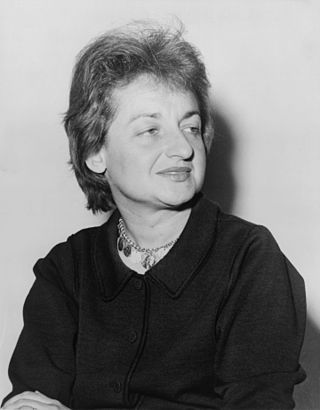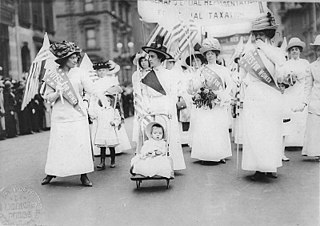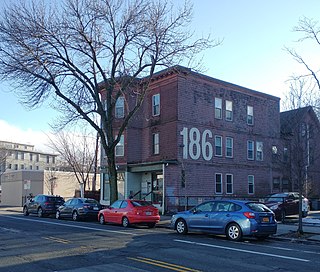Radical feminism is a perspective within feminism that calls for a radical re-ordering of society in which male supremacy is eliminated in all social and economic contexts, while recognizing that women's experiences are also affected by other social divisions such as in race, class, and sexual orientation. The ideology and movement emerged in the 1960s.

Sojourner Truth was an American abolitionist and activist for African-American civil rights, women's rights, and alcohol temperance. Truth was born into slavery in Swartekill, New York, but escaped with her infant daughter to freedom in 1826. After going to court to recover her son in 1828, she became the first black woman to win such a case against a white man.
Triple oppression, also called double jeopardy, Jane Crow, or triple exploitation, is a theory developed by black socialists in the United States, such as Claudia Jones. The theory states that a connection exists between various types of oppression, specifically classism, racism, and sexism. It hypothesizes that all three types of oppression need to be overcome at once.

Gloria Jean Watkins, better known by her pen name bell hooks, was an American author, theorist, educator, and social critic who was a Distinguished Professor in Residence at Berea College. She was best known for her writings on race, feminism, and class. She used the lower-case spelling of her name to decenter herself and draw attention to her work instead. The focus of hooks' writing was to explore the intersectionality of race, capitalism, and gender, and what she described as their ability to produce and perpetuate systems of oppression and class domination. She published around 40 books, including works that ranged from essays, poetry, and children's books. She published numerous scholarly articles, appeared in documentary films, and participated in public lectures. Her work addressed love, race, social class, gender, art, history, sexuality, mass media, and feminism.

Betty Friedan was an American feminist writer and activist. A leading figure in the women's movement in the United States, her 1963 book The Feminine Mystique is often credited with sparking the second wave of American feminism in the 20th century. In 1966, Friedan co-founded and was elected the first president of the National Organization for Women (NOW), which aimed to bring women "into the mainstream of American society now [in] fully equal partnership with men.”
The history of feminism comprises the narratives of the movements and ideologies which have aimed at equal rights for women. While feminists around the world have differed in causes, goals, and intentions depending on time, culture, and country, most Western feminist historians assert that all movements that work to obtain women's rights should be considered feminist movements, even when they did not apply the term to themselves. Some other historians limit the term "feminist" to the modern feminist movement and its progeny, and use the label "protofeminist" to describe earlier movements.
Second-wave feminism was a period of feminist activity that began in the early 1960s and lasted roughly two decades, ending with the feminist sex wars in the early 1980s and being replaced by third-wave feminism in the early 1990s. It occurred throughout the Western world and aimed to increase women's equality by building on the feminist gains of the late 19th and early 20th centuries.
Marxist feminism is a philosophical variant of feminism that incorporates and extends Marxist theory. Marxist feminism analyzes the ways in which women are exploited through capitalism and the individual ownership of private property. According to Marxist feminists, women's liberation can only be achieved by dismantling the capitalist systems in which they contend much of women's labor is uncompensated. Marxist feminists extend traditional Marxist analysis by applying it to unpaid domestic labor and sex relations.

Eleanor Marie Smeal is an American women's rights activist. She is the president and a cofounder of the Feminist Majority Foundation and has served as president of the National Organization for Women for three terms, in addition to her work as an activist, grassroots organizer, lobbyist, and political analyst.
Off Our Backs was an American radical feminist periodical that ran from 1970 to 2008, making it the longest-running feminist periodical in the United States. Marilyn Salzman-Webb and Marlene Wicks were among Off Our Backs original founders, creating the periodical in Washington, D.C. as a response to what many felt was an underrepresentation of the women’s liberation movement in mainstream media. It was a self-sustaining periodical edited and published by a collective of women consisting mainly of volunteers who practiced consensus decision-making. Reporting on feminism related topics, the periodical transitioned from a monthly to a bi-monthly newspaper, and ultimately to a quarterly magazine before financial difficulties led to its termination in 2008.
The Combahee River Collective (CRC) was a Black feminist lesbian socialist organization active in Boston, Massachusetts, from 1974 to 1980. The Collective argued that both the white feminist movement and the Civil Rights Movement were not addressing their particular needs as Black women and more specifically as Black lesbians. Racism was present in the mainstream feminist movement, while Delaney and Manditch-Prottas argue that much of the Civil Rights Movement had a sexist and homophobic reputation.
Noreen Connell is an American feminist organizer and writer/editor, known for producing, with fellow New York Radical Feminists (NYRF) member Cassandra Wilson, the 1974 New American Library book Rape: A First Sourcebook for Women by New York Radical Feminists. She first joined the feminist movement through the August 26, 1970, New York City Women's Strike for Equality March and Rally and an autumn 1970 NYRF consciousness-raising group. After working as a NYRF conference and speak-out organizer and a founding member of the Women Office Workers in the early 1970s, Connell has chiefly served as an elected officer of women's rights advocacy groups such as the National Organization for Women (NOW).

Feminism is aimed at defining, establishing, and defending a state of equal political, economic, cultural, and social rights for women. It has had a massive influence on American politics. Feminism in the United States is often divided chronologically into first-wave, second-wave, third-wave, and fourth-wave feminism.
African-American women began to agitate for political rights in the 1830s, creating the Boston Female Anti-Slavery Society, Philadelphia Female Anti-Slavery Society, and New York Female Anti-Slavery Society. These interracial groups were radical expressions of women's political ideals, and they led directly to voting rights activism before and after the Civil War. Throughout the 19th century, African-American women such as Harriet Forten Purvis, Mary Ann Shadd Cary, and Frances Ellen Watkins Harper worked on two fronts simultaneously: reminding African-American men and white women that Black women needed legal rights, especially the right to vote.

Osawatomie was a magazine published by the Weather Underground Organization (WUO), beginning in March 1975 and continuing for six issues until the June-July 1976 issue. It was started as a quarterly publication, but from the April/May 1976 issue its frequency became bimonthly. The magazine was based in Boston.
Feminism in Thailand is perpetuated by many of the same traditional feminist theory foundations, though Thai feminism is facilitated through a medium of social movement activist groups within Thailand's illiberal democracy. The Thai State claims to function as a civil society with an intersectionality between gender inequality and activism in its political spheres.
Leith Patricia Mullings was a Jamaican-born author, anthropologist and professor. She was president of the American Anthropological Association from 2011–2013, and was a Distinguished Professor of Anthropology at the Graduate Center of the City University of New York. Mullings was involved in organizing for progressive social justice, racial equality and economic justice as one of the founding members of the Black Radical Congress and in her role as President of the AAA. Under her leadership, the American Anthropological Association took up the issue of academic labor rights.

New Words Bookstore was a feminist bookstore based in Cambridge, Massachusetts. It opened in 1974, one of the first feminist bookstores in the United States, and moved to larger premises two years later. It gained an international reputation, and by 1989 was the largest feminist bookstore in the U.S. in terms of sales. After the bookstore closed in 2002, the Center for New Words (CNW) continued its legacy until this organization closed its doors in 2008 and some of its activities were undertaken by Women, Action & the Media (WAM!).
White feminism is a term which is used to describe expressions of feminism which are perceived as focusing on white women while failing to address the existence of distinct forms of oppression faced by ethnic minority women and women lacking other privileges. Whiteness is crucial in structuring the lived experiences of white women across a variety of contexts. The term has been used to label and criticize theories that are perceived as focusing solely on gender-based inequality. Primarily used as a derogatory label, "white feminism" is typically used to reproach a perceived failure to acknowledge and integrate the intersection of other identity attributes into a broader movement which struggles for equality on more than one front. In white feminism, the oppression of women is analyzed through a single-axis framework, consequently erasing the identity and experiences of ethnic minority women in the space. The term has also been used to refer to feminist theories perceived to focus more specifically on the experience of white, cisgender, heterosexual, able-bodied women, and in which the experiences of women without these characteristics are excluded or marginalized. This criticism has predominantly been leveled against the first waves of feminism which were seen as centered around the empowerment of white middle-class women in Western societies.
Sojourner: The Women's Forum was an American feminist periodical published in Cambridge, Massachusetts from 1975 until 2002. Started by a women's group from MIT, the newspaper initially aimed to provide a space for just MIT women to communicate their "ideas, their art, talents, and skills, as well as their needs as women, to the rest of the community."







